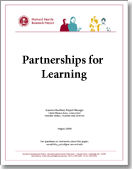The Harvard Family Research Project separated from the Harvard Graduate School of Education to become the Global Family Research Project as of January 1, 2017. It is no longer affiliated with Harvard University.

|
March 2010 Partnerships for Learning: Promising Practices in Integrating School and Out-of-School Time Program SupportsHarvard Family Research Project |
Article Information
- Full Text (HTML)
- Full Text (PDF: 139 kb)
Related Resources
- Participation Over Time: Keeping Youth Engaged from Middle School to High School
- Selection Into Out-of-School Time Activities: The Role of Family Contexts Within and Across Neighborhood
- Testimony by Priscilla Little at the Hearing on "After School Programs: How the Bush Administration's Budget Impacts Children and Families"
Across the country many schools and communities are trying to create and support efforts to institutionalize partnerships for learning, including those that rethink the use of time across the school day and year, and across the developmental continuum. These partnerships are not merely transactional in nature but rather transformative: partnering entities work together to integrate and complement their services with the shared goal of supporting children’s learning.
Referred to by different terms—integrated, expanded, or complementary learning—the concept has one critical element in common: partners are able to create a web of learning and developmental supports for children and youth in which the linkages add up to more than the sum of their parts. The past 10 years have witnessed tremendous growth in programs and initiatives aimed specifically at developing and sustaining intentional partnerships between out-of-school time programs (OST) and schools in order to support—but not replicate—in-school learning and healthy development.
Partnerships for learning can be structured differently according to local community needs, can be housed in a variety of school and community-based settings, and can involve a range of partners, including schools, afterschool and summer programs, physical and mental health services, and other community resources.
This new report from HFRP is aimed to help school and OST program leaders, decision-makers, and funders, to understand and implement effective OST–school partnerships for learning. Specifically, the report
- Describes the benefits of OST–school partnerships for children, schools, and OST programs.
- Presents five research-derived principles of promising OST–school partnerships, offering specific strategies and examples for each.
- Profiles three “on-the-ground” partnership efforts based on the in-depth interviews conducted at the three selected sites.
- Discusses conditions for optimal success in developing sustainable OST–school partnerships.
RELATED RESOURCES
Resource Guide to School–OST Program Partnerships
An annotated bibliography of evaluations, reports, and case studies of School–OST Program Partnerships.
Partnerships for Learning: Profiles of Three School–Community Partnership Efforts
Three case studies of school–community partnerships at Greater San Jose After-School All-Stars at August Boeger Middle School in San Jose, California; Citizen Schools at Bedichek Middle School in Austin, Texas; and KIPP SHINE Prep in Houston, Texas.
